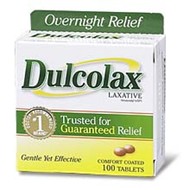 |
LaxativesContents • What Are Laxatives? |
|
Back To Guide On: |
What Are Laxatives?
Laxatives are pills you take to make you have a bowel movement. They are an over-the-counter treatment for constipation. In general, laxatives are not meant for long-term use, an exception to this is bulk-forming laxatives. If you are mildly constipated for a day or two a laxative is not necessary. However, if you have made changes to your diet and lifestyle and remain constipated, you may need to take a laxative. The following explain the differences in popular laxatives on the market: Bulk-Forming Laxatives Also known as fiber supplements, these pills are generally considered the safest. Bulk-forming laxatives are taken with water. They work by increasing the amount of feces you have (bulking them up) and softening them. This encourages your bowels to move the stool out. Brand names include Metamucil, Serutan, Fiberall, FiberCon, Konsyl and Citrucel. Natural forms are bran flakes and oat bran.
Stimulant Laxatives Stool Softeners These products soften the stool to ease passage through the digestive system. Stool softeners are usually recommended after delivery and childbirth or surgery, where 'pushing' or straining is not recommended. Brand names include Surfack, Metamucil, Peri-Colace and Colace. See constipation during pregnancy.
Oil Lubricants These laxatives grease the stool to ease passage through the intestines. Castor oil and mineral oil are the most common examples. Brand names include Zymenol, Haley’s M-O and Fleet. These forms of laxatives usually work within 6 to 8 hours. Saline Laxatives These act by drawing water, like a sponge, from the intestines to ease passage of the stool. The best selling type of saline laxative is Milk of Magnesia. Herbal Laxatives There are many herbal tonics, teas and powders on the market which may be worth trying. Herbalists recommend dandelion (which has few side effects), yellow dock, aloe and cascara bark. Another possibility is Chinese rhubarb, which should only be used in small amounts and never longer than for 2 weeks. Burdock is also recommended as a herbal laxative, but there is no solid scientific evidence that it works. As herbal products do not undergo the same stringent testing as conventional medicines, contamination and misrepresentation of dosages is a possibility. What Is The Best Laxative For Constipation? Anecdotally the team here at womens-health-advice.com, which includes lots of ladies with constipation problems, have found a herbal supplement called Cape Aloe compound to offer the most effective relief from constipation. You can buy the product online from this website: shs100.com. Many people use laxatives because they mistakenly believe that a daily bowel movement is necessary for good health. If laxatives are used consistently over a long period of time, they can in fact have the opposite effect and cause bowel disorders. They can increase constipation by weakening the intestinal muscles so that they do not work efficiently. This is even true of oil lubricants like Haley's M-O. Overuse of laxatives can also deprive the body of vitamins and essentials minerals. The use of laxatives to promote weight loss has gained some popularity in recent years, particularly with women prone to eating disorders. Unfortunately laxatives are not a good weight loss aid, as they only eliminate a small fraction of calories ingested. In fact, by the time the food has reached the intestines, most of the calories have already been absorbed, so the notion that calories can be saved, the quicker the food is passed, is simply not true. Additionally, the faster the food is 'pushed' through the digestive system, the less time your body has to absorb vitamins and essential nutrients. You may notice an initial drop in weight using laxatives, but this is due to less bulk in the intestines and less water - it does not mean you have fewer fat cells. As a short term measure, laxatives can help with constipation, but they provide an ineffective and unhealthy way to lose weight. If you have more queries, check out womens health questions.
|
| Related Articles on Laxatives
For more issues relating to bowel dysfunctions, see the following: Back to Homepage: Womens Health Advice |
|
WOMENS HEALTH ADVICE: ABOUT BOWEL DISORDERS |